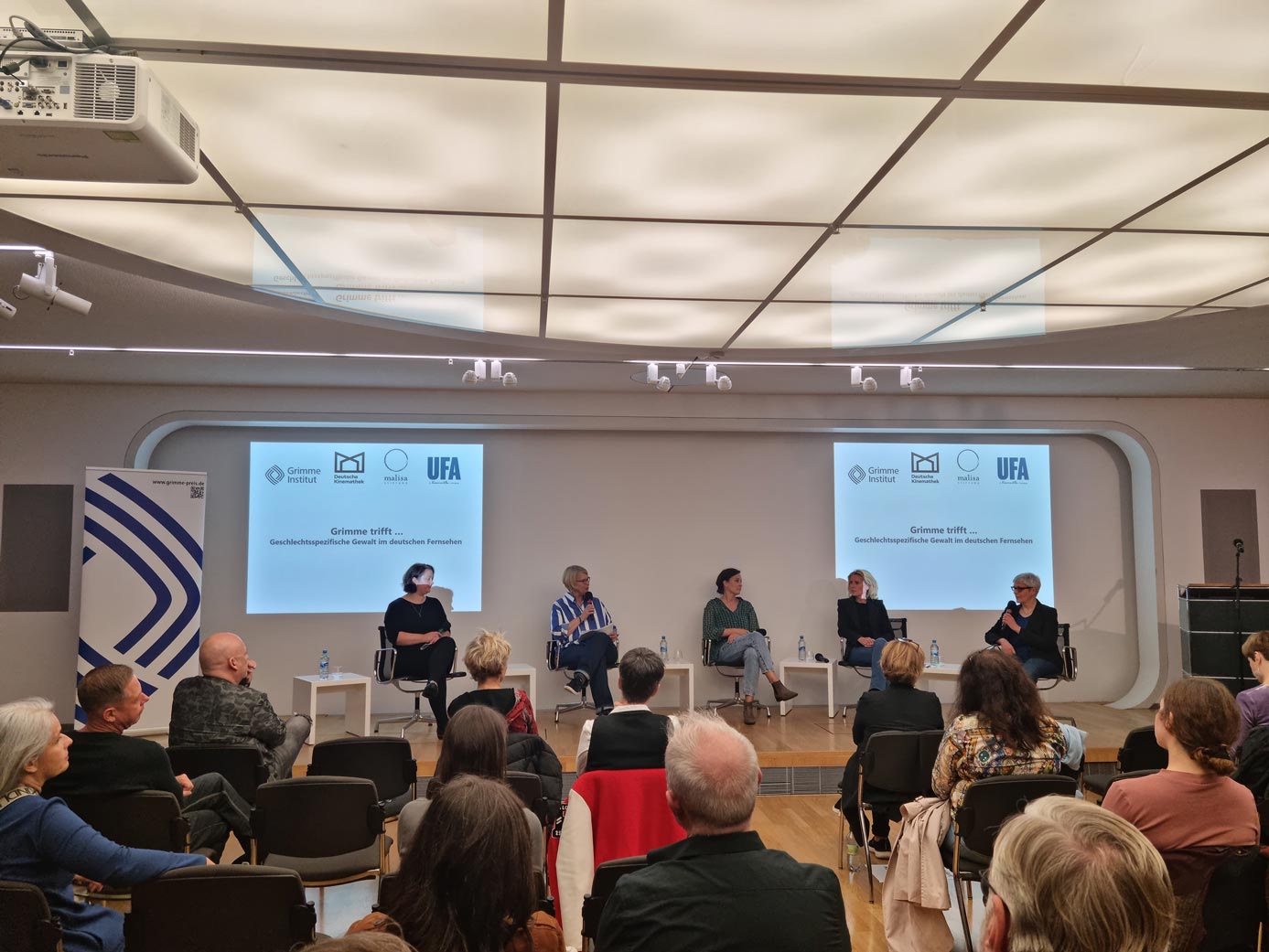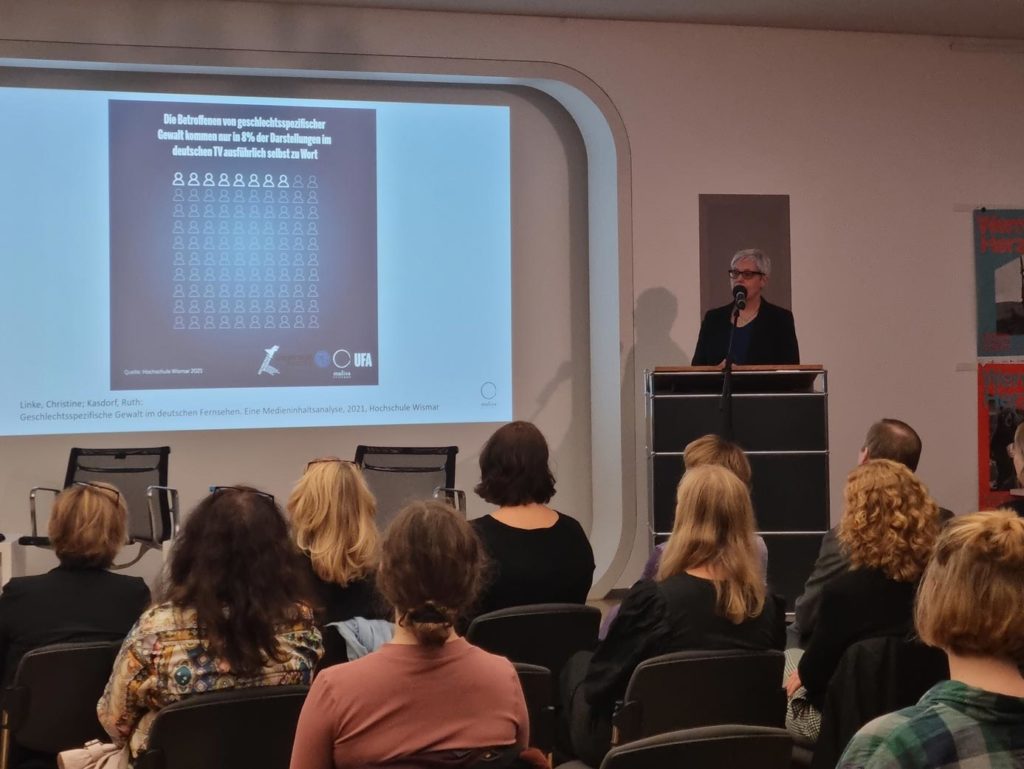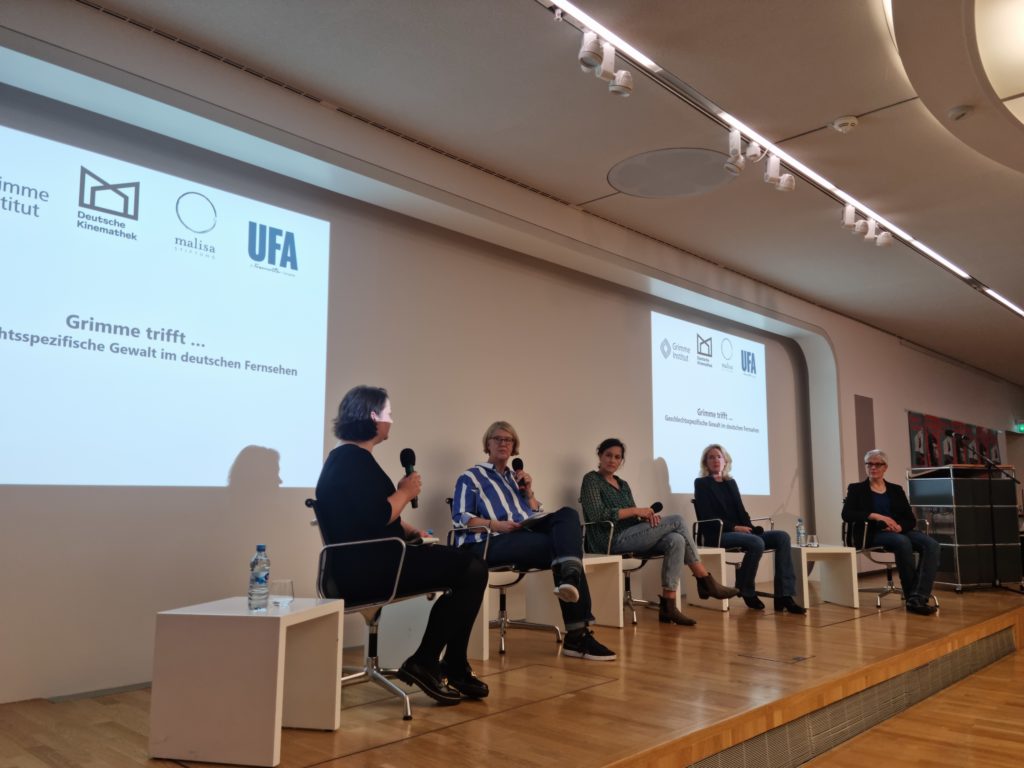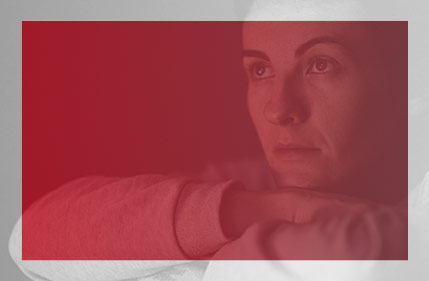EVENT: “GENDER-BASED VIOLENCE ON GERMAN TELEVISION”

On October 25th 2022, the Grimme Institute, together with the MaLisa Foundation and UFA GmbH, and in cooperation with the Deutsche Kinemathek, hosted the event, “Gender-Based Violence on German Television”. The discussion in Berlin was based on a study with the same title from 2021.
“Gender-Based Violence on German Television” was published in November 2021. Conducted by Prof. Dr. Christine Linke and Ruth Kasdorf M.A., the study is a cooperative project by Wismar University of Applied Sciences and the University of Rostock. This media content analysis provides the first representative overview for German television programming of how audiovisual media portray gender-based violence. The study was initiated and funded by the MaLisa Foundation and UFA GmbH.
At the event, “Gender-Based Violence on German Television”, on October 25, 2022, journalists and creative professionals spoke about the study and discussed areas where action is called for. Kathrin Hollmer (freelance journalist and chairwoman of the Grimme Prize nomination commission for fiction), Maria Furtwängler (actress and co-founder of the MaLisa Foundation), Karin Heisecke (director of the MaLisa Foundation), Katharina Rietz (producer, UFA Fiction GmbH), and other industry representatives took part in the discussion, including Imogen Kimmel (director and ProQuote Film) and Claudia Mikat (managing director, Freiwillige Selbstkontrolle Fernsehen). Klaudia Wick, head of the “Audiovisual Heritage – Television” department of the Kinemathek, moderated the discussion.

To introduce the panel discussion, Foundation Director Karin Heisecke presented the key results of the study: “In Germany, one in three women has experienced physical and/or sexualized violence,” Heisecke said. “With this in mind, we posed the question: How is gender-based violence portrayed on German television, how is it presented on screen?” The results showed that gender-based violence occurred in about one-third (34%) of the programs. Often this was explicit and severe violence against women and children.
“Since many women, including potential viewers, have actually experienced violence, it is important to look at whether and, if so, in what way this violence is portrayed,” Heisecke emphasized. “The perspective of victims/survivors was only reflected in approximately eight percent of the cases analyzed. No advance warning about the content was shown, and only very rarely was information provided about support services for people affected by violence. The social context and structural dimension of the violence were almost never named. Instead, violence mostly appeared as an isolated event.”
How can media become part of the solution?
Given the actual magnitude of violence against women, media have a societal responsibility. How can we envision a conscious approach to the issue, consistent with the urgency of the problem? How can stereotypical narratives be challenged while still remaining within a genre? And what does that mean for the process of storytelling? The panel addressed these questions in the discussion that followed.
Journalist Kathrin Hollmer saw a need for action concerning narrative perspective: “There is so much room on German television for the male perspective. Just focusing on the victim’s perspective, the process of coping with the experience, would be a change.” The diversity of storytelling is also very limited, she continued. Men, for example, are usually only victims of violence while committing or investigating crimes. “It is very striking in a positive way, however, when productions diverge from the stereotypical path,” Hollmer said.

Karin Heisecke pointed out the need for professionalism and quality standards: “Expert knowledge of the subject matter and an awareness of the possible effects on the audience of depictions of violence are part of a professional approach.” Bringing in experts in the development phase of programs, and integrating the subject matter in the education for media professions could have a lasting effect here. “It’s also important to ask oneself during the creative process: Why am I portraying this violence and how am I portraying it?”
Trigger warnings make sense, but are not always easy to implement in practice, according to Katharina Rietz of UFA GmbH: “Often they do not get approved, or responsibility is placed solely on the editorial team. But I hope the discussion continues, especially because we already know positive examples from England and the U.S.”
It always takes someone to get things started!
Maria Furtwängler, who has played “Tatort” commissioner Charlotte Lindholm for 20 years, explained how working with the MaLisa Foundation has heightened her sensitivity to depictions of violence in the media: “I approach things with greater sensitivity, I watch television more sensitively. At the same time, the discussion encourages me to get involved,” Furtwängler said. “Just raising the subject of portrayal of gender-based violence with partners or producers is important and worthwhile and inspires thought and change. I approach projects with certain expectations and try to encourage discussion and move it forward. It always takes someone to get things started!”
The event was the second in a series with the Grimme Institute and UFA GmbH. As part of the “Tatort Eifel” festival’s program for industry professionals, the discussion panel “Grimme meets … Tatort Eifel – Gender-Based Violence in German Thrillers” took place on September 23.
“When media address violence against women – in the news or in crime stories – they can be part of the problem, but also part of the solution.” The article by Bärbel Röben on mediendiversitaet.de shows that a rethink in editorial departments is urgently needed and makes suggestions on how media can promote change.
As a resource for media professionals, Karin Heisecke has compiled a detailed overview with potential courses of action, tips, and tools for approaching the issue, “violence against women”, in the media. The spectrum ranges from short and concise guidelines that can be used as checklists for everyday editorial work, to detailed analyses of violence against women and girls.
SUPPORT SERVICES FOR VICTIMS/SURVIVORS
The Violence Against Women support hotline is a nationwide counseling service in Germany for women who have experienced or are still experiencing violence.
The Sexual Abuse Help Portal advises young people and adults in Germany by phone and online confidentially and securely on all questions related to the topic of sexual abuse.
International information:
A table of national women’s helplines available in 46 European Countries:
https://wave-network.org/list-of-helplines-in-46-countries/
An international list of country help lines, provided by UN Women:
https://www.endvawnow.org/en/need-help
